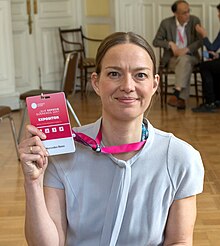Mercedes Bunz
This article has multiple issues.Please helpimprove itor discuss these issues on thetalk page.(Learn how and when to remove these template messages)
|
Mercedes Bunz | |
|---|---|
 Bunz in 2019 | |
| Born | November 16, 1971 Magdeburg,Saxony-Anhalt,Germany |
| Occupation(s) | Philosopher,journalist,art historian |
| Known for | Founder ofDe:Bug |
Mercedes Bunz(born November 16, 1971) is a Germanart historian,journalist,and the Professor of Digital Culture and Society atKing's College London.[1]
Biography[edit]
Early career[edit]
Bunz studiedphilosophyandart historyat theFreie Universität Berlin,after passing her final exams at the Celtis-Gymnasium secondary school in the German town ofSchweinfurtin 1991. Together with Sascha Kösch, Riley Reinhold, and Benjamin Weiss she founded the Berlin music monthlyDe:Bugin 1997, becoming its co-editor and editor-in-chief from 1999 until 2001.[2]
She was awarded a scholarship byHeinrich-Böll-Stiftung,enabling her to graduate atBauhaus-Universität Weimar[3]writing about the history of theinternetbetween the 1950s and the 1980s. Herdissertationthesiswas published as a non-fiction book in 2008. This was also used by Melih Bilgil in his 2009 animationHistory of the Internet.[4]
Work[edit]
Mercedes Bunz's work has been both academic and journalistic. Having worked as a freelance journalist for a period, Bunz became a lecturer atBielefeld University.In that same year she also began working for Berlin city magazinezitty[5]before running the on-line business of the German dailyTagesspiegel.[6]In 2009, she joined the London newspaperThe Guardianas a media and technology reporter. She stayed withThe Guardianuntil the beginning of 2011, where she followed events inon-line journalismandsocial networking websites.[7][8]
In 2010 Bunz was awarded theFachjournalisten-Preisby the German association of specialist editors, orDeutscher Fachjournalisten-Verband.[9]In 2011 she held the Impakt Fellowship of the Centre for the Humanities from theUtrecht University.She has written for the German internet magazinesTelepolis[10]andCarta.
Her book on the impact of algorithms on society was published by Suhrkamp in 2012.[11]An updated version ofMercedes Bunz: The Silent Revolution: How Digitalization Transforms Knowledge, Work, Journalism and Politics without Making Too Much Noisecame out with Palgrave Macmillan in 2014.[12]The Spanish version "La Revolución Silenciosa" has been translated by Cruce and came out in 2017.[13]
She has been a member of the Interdisciplinary Network for the Critical HumanitiesTerra Critica[14]and is a co-founder of meson press,[15]an open access press that publishes research on digital cultures, technology and networked media, one outcome of the Hybrid Publishing Lab, Leuphana University, which she directed from 2012-2014.[16]
She became Senior Lecturer at theUniversity of Westminster,London in 2014.[17]In 2018, her book written together with Graham Meikle on theinternet of thingscame out withPolity,in which they explore questions regarding networked sensors andArtificial Intelligenceas things become media.[18]
On 31 October 2017 Mercedes Bunz gave evidence to theHouse of LordsSelect Committee for Artificial Intelligence and presented herArtificial Intelligenceresearch[19]on the importance of publicly available datasets given the rise ofmachine learningthat has been taken up in the report.[20]In September 2018 she started working at theDepartment of Digital Humanities, King's College London.,[21]where she is Professor of Digital Culture and Society since 2022. In 2019 her co-written book on digital communication and machine communication was co-published (open access) byUniversity of Minnesota Pressand meson press.[22]
Writings[edit]
- Mercedes Bunz:Vom Speicher zum Verteiler – Die Geschichte des Internet.Kulturverlag Kadmos,Berlin 2008,ISBN978-3-86599-025-9.
- Bunz, Mercedes."Logik der Technik: Das Denken und die Digitalisierung".FAZ.NET(in German).ISSN0174-4909.Retrieved2018-11-29.
- Mercedes Bunz:Die stille Revolution – Wie Algorithmen Wissen, Arbeit, Öffentlichkeit und Politik verändern, ohne dabei viel Lärm zu machen.Suhrkamp Verlag, edition unseld 43, Berlin 2012,ISBN978-3518260432.
- Mercedes Bunz:The Silent Revolution: How Digitalization Transforms Knowledge, Work, Journalism and Politics without Making Too Much Noise.Palgrave Macmillan, London 2014,ISBN978-1-137-37350-2.
- Mercedes Bunz:La revolución silenciosa. Cómo los algoritmos transforman el conocimiento, el trabajo, la opinión pública y la política sin hacer mucho ruido.Cruce Casa Editora, Buenos Aires 2017,ISBN978-987-45637-7-4.
- Mercedes Bunz and Graham Meikle:The Internet of Things.Polity Press, London 2018,ISBN978-1509517466.
- Paula Bialski, Finn Brunton and Mercedes Bunz:Communication.University of Minnesota Press & meson press, Minneapolis 2019,ISBN978-1517906474.
References[edit]
- ^"King's College London, Faculty of Arts and Humanities, Department of Digital Humanities: Staff".Retrieved14 July2023.
- ^Weichert, Stephan; Zabel, Christian (2010)."Mercedes Bunz – Das Tornado-Mädchen"(in German). Archived fromthe originalon 2 June 2011.Retrieved11 June2011.
- ^"Profil von Mercedes Bunz"(in German). Carta. Archived fromthe originalon 26 July 2011.Retrieved11 June2011.
- ^Bilgil, Melih (2009)."History of the Internet".YouTube.Retrieved2 January2012.
- ^Reimann, Anna (30 August 2006)."Zitty'-Chefredakteurin Bunz Die Ausgepennte".Spiegel Online(in German).Retrieved11 June2011.
- ^Kösch, Sascha (15 February 2007)."Mercedes geht zu Tagesspiegel-Online. Von einem Chefredakteursposten zum nächsten"(in German). De:Bug.Retrieved11 June2011.
- ^"Mercedes Bunz Profile".The Guardian.Retrieved11 June2011.
- ^Voß, Jochen (7 August 2009)."Private Gründe Chefredakteurin Bunz verlässt".tagesspiegel.de(in German). DWDL.de.Retrieved11 June2011.
- ^"Deutscher Fachjournalisten-Kongress in Berlin: Dr. Mercedes Bunz erhält Fachjournalisten-Preis 2010".Deutscher Fachjournalisten-Verband. 4 November 2010. Archived fromthe originalon 25 March 2012.Retrieved11 June2011.
- ^"Artikel von Mercedes Bunz".Telepolis. Archived fromthe originalon 25 April 2011.Retrieved11 June2011.
- ^Bunz, Mercedes."Digitale Wahrheiten".Suhrkamp Verlag.Retrieved2 January2012.
- ^The Silent Revolution: How Digitalization Transforms Knowledge, Work, Journalism and Politics without Making Too Much Noise.Palgrave Macmillan.Retrieved25 February2016.
- ^"Mercedes Bunz: La Revolución Silenciosa".Cruce Casa.Retrieved2 September2018.
- ^"Terra Critica".2 August 2017.Retrieved24 January2018.
- ^"Meson Press".Retrieved24 January2018.
- ^"Hybrid Publishing".Retrieved24 January2018.
- ^"University of Westminster: Dr Mercedes Bunz presents AI research to the House of Lord's Select Committee".Retrieved17 August2019.
- ^"The Internet of Things".Polity Press.Retrieved24 January2018.
- ^"House of Lords Select Committee on Artificial Intelligence: Corrected oral evidence Tuesday 31 October 2017".Retrieved17 August2019.
- ^"House of Lords Select Committee on Artificial Intelligence: Report of Session 2017–19 'AI in the UK: ready, willing and able?'"(PDF).Retrieved17 August2019.
- ^"King's College London, Faculty of Arts and Humanities, Department of Digital Humanities: Staff".Retrieved2 September2018.
- ^"Communication".University of Minnesota Press & meson press.Retrieved17 August2019.
External links[edit]
- 1971 births
- Living people
- German women journalists
- Mass media theorists
- Online journalists
- German women philosophers
- German art historians
- German women art historians
- 20th-century German historians
- 20th-century German philosophers
- 20th-century German women writers
- 21st-century German historians
- 21st-century German philosophers
- 21st-century German women writers
- Writers from Magdeburg
- German magazine editors
